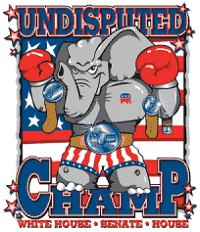
Read the full story here.
- No Republican is being taken by surprise, unlike many Democrats in 1994. Shortly after Bush's reelection, White House and Republican National Committee officials began working to convince House members that the formidable reelection record for incumbents (since 1996, 97.5 percent) was not something they could take for granted. "What we attempted to do last year," said one of these officials, "was to go out of our way to say to people: 'You face a potential of a race. In order to win as an incumbent, you better have a plan,' " including an intensive focus on voter registration, a message plan that would unfold in phases, and a ground organization that was operating in a measurable, quantifiable way. One official involved in the process said Republican officials deliberately "scared" lawmakers, telling them: "You face a very tough road. You better be ready."
- Absentee ballot requests and returns, closely tracked by the party, are meeting or exceeding past levels for Republicans in key states and districts. Republican officials say White House Deputy Chief of Staff Karl Rove and party operatives are scrutinizing this data with the same intensity that they followed metrics like voter registration earlier in the cycle. For at least 68 races, they have been getting reports once a week on the number of voters registered, phone calls completed and doors knocked on. Now, they're getting a second report on the number of absentee ballots requested, absentee ballots returned and early votes cast. "We can look at that data flow and make an assumption about what's going on and plotting it out," a Republican official said.
- When the national parties, national campaign committees, state "victory" committee accounts and competitive campaigns are added up, Republicans maintained a substantial financial advantage over Democrats at the last filing period. "We didn't look on it as one pot," said one official involved in the process. "We looked upon it as four pots, with synergy available through all four."
Republicans say the district-by-district playing field favors them in several structural ways not reflected in national polls. Here is their thinking, starting with statistics from the President's 2004 race against John F. Kerry: "There are 41 districts held by a Democrat that Bush carried, and 14 seats held by Republican that Kerry carried, so we're fighting on better turf. You see it in the open seats, where Bush carried 18 of the Republican open seats and Kerry carried two. So we're fighting on better turf."
The get-out-the-vote machine designed by Rove and now-Republican National Committee Chairman Ken Mehlman in 2001 was dubbed the "72-hour" program, but officials say that's quite a misnomer and that it's really a 17-week or even two-year program. "In Ohio, we are making more phone calls this year than we made two years ago," said an official involved in the process. "Now, that's not the case necessarily in Virginia, which was not a battleground state. You have to build that. In other places, we built that and built it early."